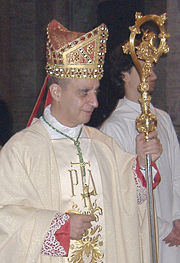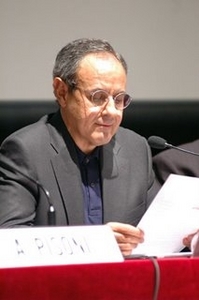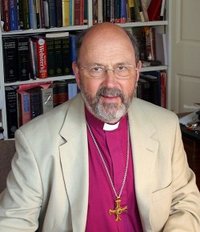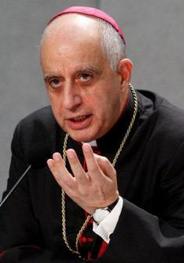 In some comments made of a book on the papacy of Benedict XVI, Archbishop Rino Fisichella said that at the beginning of every pontificate the new pope and the Church face certain challenges that are normal. As Fisichella, the head of the Pontifical Council for Promoting New Evangelization reminded his audience, we’re only 6 years into Benedict’s ministry as the head of the Catholic Church. None of the things that blotted the pope’s copybook (that is, have caused the Pope to expend political capitol) are new and that extraordinary; change is always needed in the Church moving to a new administration. All of the recent popes have had to deal the growing pains of transitioning from pontificate to another. In Fisichella’s interpretation, and I concur, the central issue of Benedict’s work is one of formation, a new education in the faith of all the faithful, including the higher and lower clergy. However, I do think that some of the people that work directly or indirectly at the Holy See have not been as helpful as they possibly could be so as not to have Benedict kicked by the secular media at every “major” event.
In some comments made of a book on the papacy of Benedict XVI, Archbishop Rino Fisichella said that at the beginning of every pontificate the new pope and the Church face certain challenges that are normal. As Fisichella, the head of the Pontifical Council for Promoting New Evangelization reminded his audience, we’re only 6 years into Benedict’s ministry as the head of the Catholic Church. None of the things that blotted the pope’s copybook (that is, have caused the Pope to expend political capitol) are new and that extraordinary; change is always needed in the Church moving to a new administration. All of the recent popes have had to deal the growing pains of transitioning from pontificate to another. In Fisichella’s interpretation, and I concur, the central issue of Benedict’s work is one of formation, a new education in the faith of all the faithful, including the higher and lower clergy. However, I do think that some of the people that work directly or indirectly at the Holy See have not been as helpful as they possibly could be so as not to have Benedict kicked by the secular media at every “major” event.
Tag: Rino Fisichella
Papal document establishing Office of the New Evangelization: Ubicumque et Semper (Everywhere and always)
Apostolic Letter in the Form of Motu Proprio
Ubicumque et Semper
It is the duty of the Church to proclaim always and everywhere the Gospel of Jesus Christ. He, the first and supreme evangelizer, commanded the Apostles on the day of his Ascension to the Father: “Go therefore and make disciples of all nations, baptizing them in the name of the Father and of the Son and of the Holy Spirit, teaching them to observe all that I have commanded you” (Mt 28:19-20). Faithful to this mandate, the Church–a people chosen by God to declare his wonderful deeds (cf. 1 Peter 2:9)–ever since she received the gift of the Holy Spirit on the day of Pentecost (cf. Acts 2:14), has never tired of making known to the whole world the beauty of the Gospel as she preaches Jesus Christ, true God and true man, the same “yesterday and today and for ever” (Heb 13:8), who, by his death and Resurrection, brought us salvation and fulfilled the promise made of old. Hence the mission of evangelization, a continuation of the work desired by the Lord Jesus, is necessary for the Church: it cannot be overlooked; it is an expression of her very nature.
Dolan appointed consultor new Vatican Office
 Pope Benedict XVI is building his new team of consultors for the papal agency, the Pontifical Council for the Promotion of the New Evangelization, charged to proclaim the Gospel always and everywhere in a secularized world. This new team really becomes the minds that will build the architecture for the work of the Council. This new Vatican office is slated to be one the most important Vatican offices dealing with building the Kingdom of Heaven. The head of the new council is Archbishop Rino Fisichella.
Pope Benedict XVI is building his new team of consultors for the papal agency, the Pontifical Council for the Promotion of the New Evangelization, charged to proclaim the Gospel always and everywhere in a secularized world. This new team really becomes the minds that will build the architecture for the work of the Council. This new Vatican office is slated to be one the most important Vatican offices dealing with building the Kingdom of Heaven. The head of the new council is Archbishop Rino Fisichella.
Today, list has, among others, Archbishop Timothy M. Dolan, Archbishop of New York. He joins the likes of:
The Eminent Lord Cardinals: Christoph Schönborn, OP, Archbishop of Vienna (Austria); Angelo Scola, Patriarch of Venice (Italia); George Pell, Archbishop of Sydney (Australia); Josip Bozanić, Archbishop of Zagreb (Croatia); Marc Ouellet, PSS, Prefect of the Congregation for Bishops; Francisco Robles Ortega, Archbishop of Monterrey (Mexico); Odilo Pedro Scherer, Archbishop of São Paulo (Brasil); William Joseph Levada, Prefect of the Congregation for the Doctrine of the Faith; Stanisław Ryłko, President of the Pontifical Council for the Laity; and their Excellencies: Claudio Maria Celli, titular Archbishop of Civitanova, President of the Pontifical Council for Social Communication; Nikola Eterović, titular Archbishop of Cibale, Secretary General of the Synod of Bishops; Pierre-Marie Carré, Coadjutor Archbishop of Montpellier (France); Timothy Michael Dolan, Archbishop of New York (USA); Robert Zollitsch, Archbishop of Freiburg im Breisgau (Germany); Bruno Forte, Archbishop of Chieti-Vasto (Italy); Bernard Longley, Archbishop of Birmingham (Great Britain); André-Joseph Léonard, Archbishop of Mechelen-Brussel, Malines-Bruxelles (Belgium); Adolfo González Montes, Bishop of Almería (Spain); Vincenzo Paglia, Bishop of Terni-Narni-Amelia (Italy).
All of the members of the consultors have some experience of and leadership in the ongoing work of evangelization in their respective milieu. Noteworthy, several of the cardinals and bishops have connections with Communion and Liberation and Sant’Egidio, Schonstatt movements, the Emmanuel Community and the Christian Life Community.
This Council is not only orienting its work to Europe but to the entire world, giving God a voice.
New Papal document: Ubicumque et Semper (Everywhere and always) making a Vatican Office for the New Evangelization
The Holy Father published a long-awaited Motu Proprio, Ubicumque et semper, by which he established a new office (dicastery) at the Roman Curia: “Pontifical Council for Promotion of the New Evangelization.” The new head of the Council is, as you know, Archbishop Rino Fisichella.
The objectives of the new Pontifical Council:
- To deepen the theological and pastoral meaning of the new evangelization.
- To promote and to foster in close collaboration with bishops’ conferences, teaching of the Magisterium relative to the new evangelization.
- To make known initiatives already under way in local churches and to promote new initiatives, involving also resources of religious institutes and groups of the faithful and new lay communities;
- To study and to foster the use of modern means of communications as instruments for the new evangelization.
- To promote the Catechism of the Catholic Church.
A summary of Ubicumque et semper can be read here.
I am happy that a papal document finally appeared since it was expected since four months ago. Now a more concerted effort at the needs of evangelization will be worked on by the Roman Curia and that good works already in play with groups like Communion and Liberation, Opus Dei, Focolare, Sant’Egidio will be more coordinated and collaborated with. I hope the big religious orders like the Benedictines, Franciscans and Dominicans will respond positively to the hopes and desires of the Pope. The expectation of the new Council are looking to re-energize the work of evangelization of culture and to give renewed interest and thrust of the Church as missionary. Please note, secularism, not secularity needs to be addressed by the entire Church, not just the bishops and certainly not just the Roman Curia.
The Pope said, “At the root of all evangelization there is no human project of expansion, but the desire to share the priceless gift that God wished to give us, sharing His life with us.”
There are, however, a number of missed opportunities already since the announcement of the Council: there was a too long of wait for the motu proprio, the motu proprio is only available in Latin and Italian at this point, the staff has not been announced, and there is no web presence for the new Council as of yet. Another example of not doing the homework on the part of those who work for the Pope.
A new Vatican office: Pontifical Council for the New Evangelization?
Writing for il Giornale.it today, veteran vaticanista Andrea Tornielli, speaks of a new pontifical council to be created specifically for the work of the new evangelization, a term coined by Pope John Paul II in 1979 while visiting the Poland’s Nowa Huta. Pope Benedict is expected to release an Apostolic Letter soon. The idea comes to fruition because of the diligence of Venice’s cardinal-archbishop, Angelo Scola, and Josef Cordes and the inspiration of Monsignor Luigi Giussani, founder of the Fraternity of Communion and Liberation. A new council with this work is seen as keenly central to the work of Benedict’s papacy. The first head of the new council is expected to be according to Tornielli, Archbishop Rino Fisichella, the current head of the Pontifical Academy of Life and the rector of the Lateran University.
Some interesting interventions at the Synod
Most Rev. Paolo Pezzi, F.S.C.B., Archbishop of Mother of God in Moscow
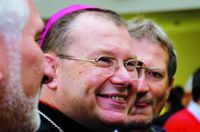 In this historical moment, the Word of God cannot be separated from the event of Jesus Christ
In this historical moment, the Word of God cannot be separated from the event of Jesus Christ
In present relativism, which leans to level off any differences, so that all words are valid and none is more valid than the other, where all is reduced to a game of opinions, the Biblical word must incarnate itself in the beauty of its witnesses, if it wants to draw the world towards the truth. In Instrumentum Laboris (48), it is cleverly pointed out that “Making the Word of God and the Sacred Scriptures the soul of his pastoral activity, the bishop is capable of bringing the faithful to encounter Christ” […] “so that, through their own experience, the faithful will see that the words of Jesus are spirit and life (cf. Jn 6:63) […]”.
The announcement of the Word of God, should therefore have as its scope making persons, so to speak, that they are in the presence of the living Person: be witnesses of the Person of Jesus Christ, the Logos became flesh. Or according to Saint Paul’s splendid words: it should be “a clear picture of Jesus Christ crucified, right in front of your eyes“. The Word of God is a source of an evermore deep and authentic knowledge of Christ, of “the knowledge of God’s glory, the glory on the face of Christ” (2 Cor 4:6). Such glory of Christ kindles a fire in us, becomes a desire to witness Him. It is said in Instrumentum Laboris (54) that “listening to the Word of God is a priority for our ecumenical commitment”. It is necessary to renew among Christians the tension towards the person of Christ Himself, the desire to understand and know more deeply His mystery. Through the encounter with the Word made flesh, made possible by the Spirit, we rediscover communion with Him: it is the force of the Spirit of the Risen Christ that attracts the scattered people towards His only body.
Most Rev. Salvatore Fisichella, President of the Pontifical Academy for Life; Rector of the Pontifical Lateran University
The Dei Verbum had still not been discovered and developed in its great intuition that constituted an authentic dogmatic progress; the Council fathers in fact had recovered the Biblical concept of the uniqueness of the source. This allowed Sacred Scripture to be understood within the life of the Church which does not just live by it but is responsible for its being alive, complete and fruitful. Many believers when asked what they mean by “Word of God” reply: the Bible. This is not a wrong answer, but it is incomplete or at least it shows an incomplete perception of the richness present in the expression and leads, as a consequence, to identifying Christianity as the “religion of the book”. It is necessary that in our language we do not fall into the uncertain expression “the three religions of the book”. Christianity is the religion of the “word”. It is important to strive for the construction of a culture that sees sacred Scripture as a living word, dynamically open to the truth of the revelation it contains. If we do not present this teaching in its totality in the various instruments we possess for the training of our people, we risk humiliating the Word of God because we reduce it exclusively to a written text without the provocative force to bring meaning to life any longer. As the Apostle reminds us: “God’s message cannot be chained up” (2 Tm 2:9).
What we are always faced with is the inexhaustibility of the Word of God; it is like the bush that burns without going out. We are called to exercise a ministry that permits this Word of Life to spread so that everyone in every part of the world can grasp its profound meaning in such a way as to obtain salvation. In a time like ours filled with attempts to marginalize the sacred texts as bearers of meaning only insofar as they are myths, with no historical character and destined only for the naïve, it is important that they find the necessary forms to restore historical value and provocativeness about the sense of existence. We really are faced with a teaching emergency that brings back to the center of our life of faith the theme of salvation. Again Dei Verbum reminds us how much has been transmitted and written on the “salvation announcement” (DV 7). The various cultural tendencies present in the modern world have not only perverted the meaning of salvation but they have marginalized it as useless and illusionary. Representing the Word of God in its totality means pointing the scope of its teaching towards the theme of our salvation.
Father Father Julián Carrón, President of the Fraternity of Communion and Liberation
The Church’s recent Magisterium offers us some elements for avoiding any possible reduction regarding this difficulty.
It was the Second Vatican Council’s merit to have recuperated a concept of revelation as the event of God in history. In fact, Dei Verbum allows us to understand revelation as the event of the self-communication of the Trinity in the Son, both the mediator and the fullness of all revelation,” in whom “the deepest truth about God and the salvation of man shines out,” (DV2) through the Holy Spirit in human history. It is Christ who “perfected revelation by fulfilling it through his whole work of making Himself present and manifesting Himself: through His words and deeds, His signs and wonders, but especially through His death and glorious resurrection from the dead and final sending of the Spirit of truth.” (DV 4).
The encyclical Deus Caritas Est quite rightly recalls that “Being Christian is not the result of an ethical choice or a lofty idea, but the encounter with an event, a person, which gives life a new horizon and a decisive direction. (DCE 1¸cf. FR 7)
This event does not belong only to the past, to one moment of time and space, but remains present in history, communicating itself through the whole life of the Church that welcomes it. For “Christ’s relevance for people of all times is shown forth in his body, which is the Church. (VS 25 cf. FR 11). As the Apostles transmitted “what they had received from the lips of Christ, from living with Him, and from what He did” (DV 7), so the Church “in her teaching, life and worship, perpetuates and hands on to all generations all that she herself is, all that she believes” (DV 8). Precisely because of this character of event proper to revelation and to its transmission, the Conciliar Constitution stresses that though “expressed in a special way in the inspired books” (cf. DV 8), the event of revelation does not coincide with Holy Scripture. The word of the Bible witnesses Revelation, but does not contain it in such a way as to be able to exhaust it in itself. For this reason, “it is not from Sacred Scripture alone that the Church draws her certainty about everything which has been revealed” (DV 9).
If revelation has the character of an historical event, when it comes into contact with man it cannot fail to strike him, provoking his reason and his freedom. The Gospel narratives in their simplicity show this, witnessing to the wonder that Jesus’ person aroused in those who met Him (Cf. Mk 1:27; 2:12; Lk 5:9) Jesus’ presence widens our vision so we can see and recognize what is before us (Cf. Lk 24, Emmaus). The encyclical Fides et Ratio insists on this when it affirms that men “can make no claim upon this truth [of revelation], which comes to them as gift and which, set within the context of interpersonal communication, urges reason to be open to it and to embrace its profound meaning” (FR 13).
So the encyclical characterizes the impact that revealed truth provokes in man who encounters it with a twofold impulse: a) it widens reason so as to make it adequate to the object; b) it facilitates the acceptance of its deep meaning. Instead of mortifying man’s reason and freedom, revelation enables both to grow to the fullness of their original condition.
Relationship with the tradition living in the Church’s body enables each and every man to share in the experience of those who encountered Jesus. Astounded by His unique exceptionality, these began a journey that enabled them to reach certainty about his absolute claim, that of being God. Those who make this journey do not accept naively the tradition they meet, but on the contrary put it to the proof, thus enabling their reason to grasp its truth.
The experience of encounter with Christ present in the Church’s living tradition is an event and becomes, therefore, the determining factor in the interpretation of the biblical text. It is the only way to enter into harmony with the experience witnessed by the text of Scripture, for “correct knowledge of the biblical text is accessible only to those who have a lived affinity with what the text speaks of” (PCB 70). I was able to document this hermeneutical principle in a simple but meaningful episode that occurred some years ago in Madrid. There was a young man who had had no contact with Christianity; when he met a living Christian community he began to participate and to attend Holy Mass. After the first occasions of hearing the Gospel, he commented: “What happened to us happened to them!” It was the ecclesial present that disclosed the meaning of the Gospel account.
In synthesis, “[The apostles’] capacity to believe was completely sustained and activated by the revealing person of Jesus,” according to the fine expression of [Cardinal] Hans Urs von Balthasar, enabled them to grasp the mystery of His person and adhere to Him. Analogically, today our reason needs the Event present in the tradition of living witnesses so as to open up to the Mystery of Christ, who comes towards us in them. But we will be able to recognize the unmistakable features of Jesus Christ only if we are familiar with the unique, canonical witness of His absolutely original features offered by the Sacred Scriptures. St. Augustine summarized it well: “In manibus nostris sunt codices, in oculis nostris facta.”
Cardinal Daniel N. DiNardo, Archbishop of Galveston-Houston
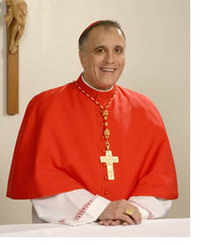 The Eternal Word emptied himself for our salvation. In an analogous way the Holy Spirit has also given and “humbled” himself in the inspiration of the Holy Scriptures. With great courtesy he has adapted the divine “language” with thought towards our human nature (Dei Verbum
The Eternal Word emptied himself for our salvation. In an analogous way the Holy Spirit has also given and “humbled” himself in the inspiration of the Holy Scriptures. With great courtesy he has adapted the divine “language” with thought towards our human nature (Dei Verbum
I speak in behalf of Catholics who live in the famous Bible Belt of the Southern United States. It is a genuine location, but it is also a frame of mind, diffused through many places in the world. There are surely issues and problems with this mind set, but it has kept alive a Biblical imagination and vocabulary and a sense of divine agency in the world that is important for us. In the Instrumentum Laboris, #18 a-g and 22 c-d, the Word of God is spoken about in a deeply rich christological way. The pneumatology, however, is more discrete. Catholics in the Bible Belt need a pneumatology that can help them in reading Scripture.
I would recommend the publication of a Compendium, similar to other such documents, that would be directed to the faithful. It would be a clear and direct guide that would highlight the rich and useful methods of the Church for reading and sharing the Sacred Scriptures. Such a Compendium would be an immeasurable help for personal bible reading, for Bible Study groups etc. Totally ecclesial and Catholic, it would also be of great help in ecumenical bible studies in which many of our people are enrolled. It would help retrieve a vivid and excellent sense of the Catholic understanding of the Holy Spirit’s inspiration in the Sacred Scriptures.
Right Rev. Nicholas Thomas Wright, Bishop of Durham, Anglican Church
1. We face the same challenges as you: not only secularism and relativism, but also postmodernity. Uncertainty here breeds anxiety: (a) the Bible might tell us unwelcome things; (b) its message might be stifled.
2. A fourfold reading of scripture as the love of God: heart (Lectio Divina, liturgical reading); mind (historical/critical study); soul (church life, tradition, teaching) and strength (mission, kingdom of God). These must be balanced.
3. In particular, we need fresh mission-oriented engagement with our own culture. Paragraph 57 of the Instrumentum Laboris implies that Paul’s engagement merely purifies and elevates what is there in the culture. But Paul also confronts pagan idolatry, and so must we. In particular, we must engage critically with the tools and methods of historical/critical scholarship themselves.
4. The climax of the Canon is Jesus Christ, especially his cross and resurrection. These events are not only salvific. They provide a hermeneutical principle, related to the Jewish tradition of ‘critique from within’.
5. Mary as model: Fiat (mind); Magnificat (strength); Conservabat (heart) – but also Stabat, waiting patiently in the soul, the tradition and expectation of the church, for the new, unexpected and perhaps unwelcome, but yet saving, revelation.
